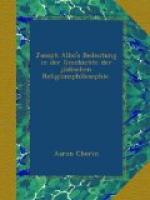|
This section contains 835 words (approx. 3 pages at 300 words per page) |

|
ALBO, YOSEF (fl. fifteenth century), Spanish Jewish philosopher. Albo was a student of the last major medieval Jewish philosopher, Ḥasdai Crescas (1340–1410), and a defender of Judaism in the Disputation of Tortosa (1413–1414). He is known for his Sefer ha-ʿiqqarim (The book of principles), which owes its popularity to an easy style (with multiple homiletical digressions) and a moderately conservative theological stance.
As its name indicates, Sefer ha-ʿiqqarim deals with dogmatics, a common theme in fifteenth-century Jewish thought. Albo took issue with Moses Maimonides (1135/8–1204), who had proposed thirteen principles of faith, and with Crescas, who had listed six. Apparently borrowing from his contemporary Shimʿon ben Tsemaḥ Duran (1361–1444), Albo reduced the principles of any divine religion to three: the existence of God, divine revelation, and reward and punishment. These major principles entail eight further derivative principles. The existence of God implies belief in his unity, incorporeality...
|
This section contains 835 words (approx. 3 pages at 300 words per page) |

|


